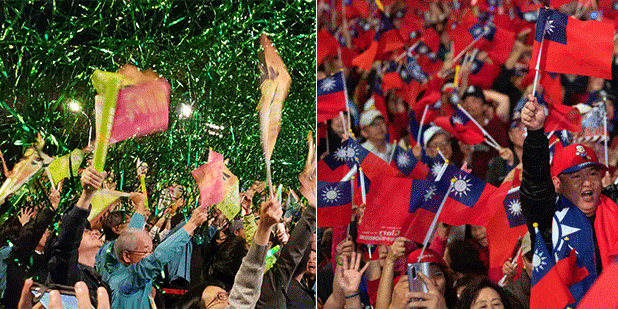Join us for a free one-day workshop for educators at the Japanese American National Museum, hosted by the USC U.S.-China Institute and the National Consortium for Teaching about Asia. This workshop will include a guided tour of the beloved exhibition Common Ground: The Heart of Community, slated to close permanently in January 2025. Following the tour, learn strategies for engaging students in the primary source artifacts, images, and documents found in JANM’s vast collection and discover classroom-ready resources to support teaching and learning about the Japanese American experience.
Webinar on Taiwan’s Election: What Happened and What’s Next?
The USC U.S.-China Institute hosts a video conference looking at what the key issues were in the election and what the election means for Taiwan domestic policies, for cross-strait relations, and for U.S.-Taiwan relations.

Three out of every four voters in Taiwan went to the polls on Saturday. On January 15 at 5pm PST, (January 16 at 9am in Taiwan, Hong Kong and China), the USC U.S.-China Institute will host a video conference looking at what the key issues were in the election and what the election means for Taiwan domestic policies, for cross-strait relations, and for U.S.-Taiwan relations. Please register to join this online conference.
Taiwan’s President Tsai Ing-wen received a record 8.2 million votes, winning reelection with 57% of the ballots. Her Chinese Nationalist (Kuomintang) rival, Han Kuo-yu, received 39% of the vote. Tsai’s Democratic Progressive Party won 61 of the 113 seats in the legislature. The Kuomintang won 38 seats. Several small parties and independent also won seats. U.S. Secretary of State Mike Pompeo issued a statement congratulating Tsai on her victory and “Taiwan for once again demonstrating the strength of its robust democratic system.” Xinhua, China’s state news agency described Tsai’s election as “a temporary counter-current.” Xinhua blamed DPP cheating and said “anti-China political forces in the West openly intervened” and supported Tsai to contain China.
The discussion will be moderated by Clayton Dube, the director of the USC U.S.-China Institute. Panelists will include:
Tom Hollihan, USC Hollihan heads the USC Annenberg School doctoral program and observed the Taiwan election as a member of a Ministry of Foreign Affairs delegation. He is a specialist on political communication and is the author of several books including The Dispute over the Diaoyu/Senkaku Islands: How Media Narratives Shape Public Opinions and Challenge the Global Order and Uncivil Wars: Political Campaigns in a Media Age.
Hollihan heads the USC Annenberg School doctoral program and observed the Taiwan election as a member of a Ministry of Foreign Affairs delegation. He is a specialist on political communication and is the author of several books including The Dispute over the Diaoyu/Senkaku Islands: How Media Narratives Shape Public Opinions and Challenge the Global Order and Uncivil Wars: Political Campaigns in a Media Age.
Daniel Lynch, City University of Hong Kong Lynch taught international relations at USC for two decades before moving to Hong Kong where he teaches international relations and Chinese politics. His books include China’s Futures: PRC Elites Debate Economics, Politics, and Foreign Policy, Rising China and Asian Democratization: Socialization to “Global Culture” in the Political Transformations of Thailand, China, and Taiwan. In addition to observing this election, Lynch spent two months in Taiwan in summer 2019 for his current research.
Lynch taught international relations at USC for two decades before moving to Hong Kong where he teaches international relations and Chinese politics. His books include China’s Futures: PRC Elites Debate Economics, Politics, and Foreign Policy, Rising China and Asian Democratization: Socialization to “Global Culture” in the Political Transformations of Thailand, China, and Taiwan. In addition to observing this election, Lynch spent two months in Taiwan in summer 2019 for his current research.
Shelley Rigger, Davidson College Currently a Fulbright Scholar based in Taipei and Shanghai, Rigger is especially well-known for her book, Why Taiwan Matters: Small Island, Global Powerhouse, but she’s also the author of Politics in Taiwan: Voting for Democracy, From Opposition to Power: Taiwan’s Democratic Progressive Party, and Taiwan’s Rising Rationalism: Generations, Politics and “Taiwan Nationalism.
Currently a Fulbright Scholar based in Taipei and Shanghai, Rigger is especially well-known for her book, Why Taiwan Matters: Small Island, Global Powerhouse, but she’s also the author of Politics in Taiwan: Voting for Democracy, From Opposition to Power: Taiwan’s Democratic Progressive Party, and Taiwan’s Rising Rationalism: Generations, Politics and “Taiwan Nationalism.
 Ray Wang, National Chengchi University
Ray Wang, National Chengchi University
Wang works as an Associate Professor at National Chengchi University, Taiwan. Ray’s major research interests focus on human rights, religious freedom, and transnational advocacy networks. Currently he serves as the executive editor of Mainland China Studies (TSSCI). He is the recipient of an Excellent Young Scholar Research Fund from the Ministry of Science and Technology, Taiwan (2018-2021) and a part of the research is published in the new book, Resistance under Communist China Religious Protesters, Advocates and Opportunists (Palgrave) in 2019.
Please register now to join the roundtable.
Featured Articles
Please join us for the Grad Mixer! Hosted by USC Annenberg Office of International Affairs, Enjoy food, drink and conversation with fellow students across USC Annenberg. Graduate students from any field are welcome to join, so it is a great opportunity to meet fellow students with IR/foreign policy-related research topics and interests.
RSVP link: https://forms.gle/1zer188RE9dCS6Ho6
Events
Hosted by USC Annenberg Office of International Affairs, enjoy food, drink and conversation with fellow international students.
Join us for an in-person conversation on Thursday, November 7th at 4pm with author David M. Lampton as he discusses his new book, Living U.S.-China Relations: From Cold War to Cold War. The book examines the history of U.S.-China relations across eight U.S. presidential administrations.




